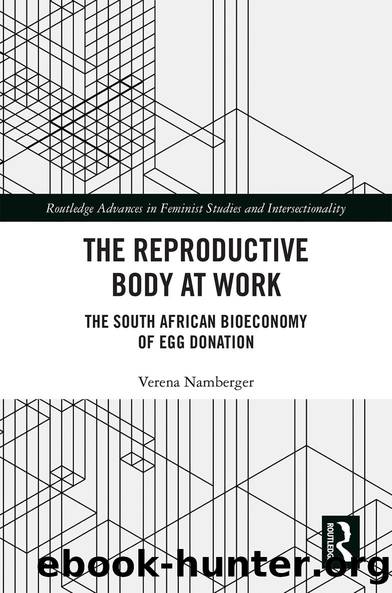The Reproductive Body at Work by Verena Namberger

Author:Verena Namberger [Namberger, Verena]
Language: eng
Format: epub
Tags: Social Science, General, Sociology
ISBN: 9780429675881
Google: TwWSDwAAQBAJ
Publisher: Routledge
Published: 2019-04-11T03:46:47+00:00
Another donor explained to me that she was doing âall those thingsâ because she would do the same if she was pregnant for the sake of the unborn baby:
I donât want to give someone else my dirty eggs, you know what Iâm saying? If it was me that had to be pregnant I wouldnât do any of those things so why am I doing it to someone else?25
In her narrative, the difference between having oocytes or a baby growing inside is blurred. In some respects, such behaviour and attitudes are already laid out in the recruiting criterion of having a âhealthy lifestyleâ. This is furthered by questions on the application form about smoking and drinking habits as well as the requirement to stop smoking during the period of donation (even though there is no way to control it). While there is no scientific proof of a positive relationship between a healthy diet, exercising and abstaining from alcohol and the quality of eggs, a lot of donors see a causal link between an unhealthy lifestyle and âdirty eggsâ. The idea of âdirty eggsâ should also be seen in relation to a widespread social concern about cleanliness and being healthy, which manifests in lifestyle trends like #cleaneating, meaning consuming food that is as natural as possible and contains minimal pesticides or refined substances. Emma Dowling aptly depicts this trend as a societal âcontamination neurosisâ (2016: para. 13). Whatâs more, âbeing a good donor girlâ does not necessarily stop at the physical level in a narrow sense, but extends to the mental condition. As another donor explains, âIâm even trying to be happier, in general. I donât know if there have been studies done on the effects of happiness on oocytes, but it canât hurt, right?â26
Some agencies actively encourage donors to think about their health and diet, e.g. through blog posts featuring nutritious recipes under headings like âYou Are What You Eatâ27 or framed by the slogan âHealthy people make healthy eggsâ.28 To improve the quality of their eggs, donors are recommended to â[i]n a nutshell â eat well, cut down (or out) caffeine, smoking and refined carbohydrates (pizzas, ready-made meals, white bread, etc.) and donât over or under exercise. Treat the body like the sanctuary it is.â29 Other professionals could not explain why many donors would attach such importance to the lifestyle aspect because there are no medical recommendations in this direction. However, one agency employee admitted with a laugh that she does not complain because:
looking after yourself, going to the gym, cutting down your cigarettes, maybe not so much the cigarettes, but not drinking, it affects your behaviours and it affects your mood. So youâre an easier and better donor to manage during that time, because youâre not hungover, so youâre on time for your appointments and you donât oversleep, so youâre just easier to manage.30
Download
This site does not store any files on its server. We only index and link to content provided by other sites. Please contact the content providers to delete copyright contents if any and email us, we'll remove relevant links or contents immediately.
Spare by Prince Harry The Duke of Sussex(5197)
Machine Learning at Scale with H2O by Gregory Keys | David Whiting(4313)
Fairy Tale by Stephen King(3399)
Will by Will Smith(2920)
The Bullet Journal Method by Ryder Carroll(2573)
Hooked: A Dark, Contemporary Romance (Never After Series) by Emily McIntire(2555)
It Starts With Us (It Ends with Us #2) by Colleen Hoover(2367)
Rationality by Steven Pinker(2365)
Can't Hurt Me: Master Your Mind and Defy the Odds - Clean Edition by David Goggins(2341)
Friends, Lovers, and the Big Terrible Thing by Matthew Perry(2230)
The Becoming by Nora Roberts(2203)
Love on the Brain by Ali Hazelwood(2078)
A Short History of War by Jeremy Black(1848)
HBR's 10 Must Reads 2022 by Harvard Business Review(1844)
The Strength In Our Scars by Bianca Sparacino(1843)
Leviathan Falls (The Expanse Book 9) by James S. A. Corey(1745)
A Game of Thrones (The Illustrated Edition) by George R. R. Martin(1745)
515945210 by Unknown(1667)
Bewilderment by Richard Powers(1621)
